straight_A illiteracy 全A 文盲
straight_A_illiteracy__全A_文盲[1]翻译
![straight_A_illiteracy__全A_文盲[1]翻译](https://img.taocdn.com/s3/m/c460da76ec3a87c24128c464.png)
straight_A_illiteracy__全A_文盲[1]翻译全A 文盲1尽管我们学校为数众多的普通文盲目前得到极大的关注,但是,我们却忽略了另一类文盲,这类文盲的困境,在从很多方面来讲,更加事关重大,因为他们更具有影响力。
这类文盲通常是一位大学的校长,但他也是位典型的博士、成功的教授和教科书作者。
我把这个人称为全A文盲,蔚蓝给予全A文盲和普通文盲一样的关注,才有了下文。
2以下的场景是我的办公室,我正在工作,做着协助治疗全A文盲(多年来我一直这样称呼这种病症)所必须做的事。
我对一篇学生论文进行询问。
查证,深入探求他的含义.这是位平均成绩全A的大四学生,聪明绝顶、口齿伶俐,刚获得一所全国重点研究生院提供的令人羡慕的奖学金。
他和我一直在一句一句地、一字一字地分析这论文,已经进行了一个小时。
“有关多种共线外因变量的选择”,我默念着他的论文,“视某些多种相互关联的共同作用系数的衍生情况而定”。
我停下来喘了口气。
“那么看看这句话,”我询问这个学生(我讽喻寓言式地称呼他为聪明先生),“这句话,聪明先生,究竟是什么意思啊?"聪明先生锁眉苦思。
最终,结合了我们的语言学知识和想象力,又用了好像一个小时似的,终于破译了这句话.我们搞清楚了聪明先生究竟试图表达的是什么,他真正想说的是什么,那就是:“供给决定需求"。
3在过去的大约十年间,我认识了许多像他这样的学生,许多大四学生都患上了这种聪明病。
侵袭了最优秀的心灵,逐渐摧毁批判的能力,使得他们丧失了发现自己或别人文章中那些莫名其妙、毫无意义的话的本领.在高等教育期间,这种病更加恶化,特别是一般在受害者拿到博士学位的时候,进入晚期、显然,聪明病的受害者不是普通的文盲病.他提交的论文里从来不会有拼写错误或标点错误;他从不使用双重否定或“irregardless”这样的词语(译者按:无论在标准或非标准变化体中都没有这个词真正的前身。
该词可能把“irrespective"和“regardless”合在一起生造出来的。
straightA_illiteracy__全A_文盲翻译
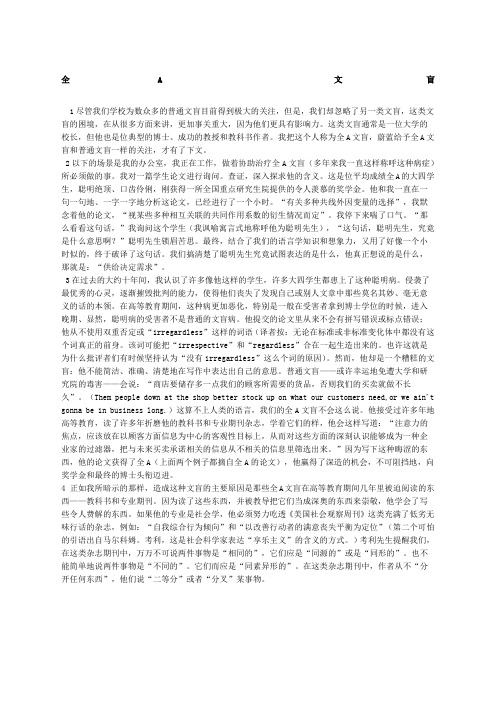
全A文盲1尽管我们学校为数众多的普通文盲目前得到极大的关注,但是,我们却忽略了另一类文盲,这类文盲的困境,在从很多方面来讲,更加事关重大,因为他们更具有影响力。
这类文盲通常是一位大学的校长,但他也是位典型的博士、成功的教授和教科书作者。
我把这个人称为全A文盲,蔚蓝给予全A文盲和普通文盲一样的关注,才有了下文。
2以下的场景是我的办公室,我正在工作,做着协助治疗全A文盲(多年来我一直这样称呼这种病症)所必须做的事。
我对一篇学生论文进行询问。
查证,深入探求他的含义。
这是位平均成绩全A的大四学生,聪明绝顶、口齿伶俐,刚获得一所全国重点研究生院提供的令人羡慕的奖学金。
他和我一直在一句一句地、一字一字地分析这论文,已经进行了一个小时。
“有关多种共线外因变量的选择”,我默念着他的论文,“视某些多种相互关联的共同作用系数的衍生情况而定”。
我停下来喘了口气。
“那么看看这句话,”我询问这个学生(我讽喻寓言式地称呼他为聪明先生),“这句话,聪明先生,究竟是什么意思啊?”聪明先生锁眉苦思。
最终,结合了我们的语言学知识和想象力,又用了好像一个小时似的,终于破译了这句话。
我们搞清楚了聪明先生究竟试图表达的是什么,他真正想说的是什么,那就是:“供给决定需求”。
3在过去的大约十年间,我认识了许多像他这样的学生,许多大四学生都患上了这种聪明病。
侵袭了最优秀的心灵,逐渐摧毁批判的能力,使得他们丧失了发现自己或别人文章中那些莫名其妙、毫无意义的话的本领。
在高等教育期间,这种病更加恶化,特别是一般在受害者拿到博士学位的时候,进入晚期、显然,聪明病的受害者不是普通的文盲病。
他提交的论文里从来不会有拼写错误或标点错误;他从不使用双重否定或“irregardless”这样的词语(译者按:无论在标准或非标准变化体中都没有这个词真正的前身。
该词可能把“irrespective”和“regardless”合在一起生造出来的。
也许这就是为什么批评者们有时候坚持认为“没有irregardless”这么个词的原因)。
straightAilliteracy_全A_文盲 翻译

全A文盲1尽管我们学校为数众多的普通文盲目前得到极大的关注,但是,我们却忽略了另一类文盲,这类文盲的困境,在从很多方面来讲,更加事关重大,因为他们更具有影响力。
这类文盲通常是一位大学的校长,但他也是位典型的博士、成功的教授和教科书作者。
我把这个人称为全A文盲,蔚蓝给予全A文盲和普通文盲一样的关注,才有了下文。
2以下的场景是我的办公室,我正在工作,做着协助治疗全A文盲(多年来我一直这样称呼这种病症)所必须做的事。
我对一篇学生论文进行询问。
查证,深入探求他的含义。
这是位平均成绩全A的大四学生,聪明绝顶、口齿伶俐,刚获得一所全国重点研究生院提供的令人羡慕的奖学金。
他和我一直在一句一句地、一字一字地分析这论文,已经进行了一个小时。
“有关多种共线外因变量的选择”,我默念着他的论文,“视某些多种相互关联的共同作用系数的衍生情况而定”。
我停下来喘了口气。
“那么看看这句话,”我询问这个学生(我讽喻寓言式地称呼他为聪明先生),“这句话,聪明先生,究竟是什么意思啊?”聪明先生锁眉苦思。
最终,结合了我们的语言学知识和想象力,又用了好像一个小时似的,终于破译了这句话。
我们搞清楚了聪明先生究竟试图表达的是什么,他真正想说的是什么,那就是:“供给决定需求”。
3在过去的大约十年间,我认识了许多像他这样的学生,许多大四学生都患上了这种聪明病。
侵袭了最优秀的心灵,逐渐摧毁批判的能力,使得他们丧失了发现自己或别人文章中那些莫名其妙、毫无意义的话的本领。
在高等教育期间,这种病更加恶化,特别是一般在受害者拿到博士学位的时候,进入晚期、显然,聪明病的受害者不是普通的文盲病。
他提交的论文里从来不会有拼写错误或标点错误;他从不使用双重否定或“irregardless”这样的词语(译者按:无论在标准或非标准变化体中都没有这个词真正的前身。
该词可能把“irrespective”和“regardless”合在一起生造出来的。
也许这就是为什么批评者们有时候坚持认为“没有irregardless”这么个词的原因)。
str精选ght精选lliter全A文盲

s t r精选g h t精选l l i t e r全A文盲集团文件发布号:(9816-UATWW-MWUB-WUNN-INNUL-DQQTY-全A 文盲1尽管我们学校为数众多的普通文盲目前得到极大的关注,但是,我们却忽略了另一类文盲,这类文盲的困境,在从很多方面来讲,更加事关重大,因为他们更具有影响力。
这类文盲通常是一位大学的校长,但他也是位典型的博士、成功的教授和教科书作者。
我把这个人称为全A文盲,蔚蓝给予全A文盲和普通文盲一样的关注,才有了下文。
2以下的场景是我的办公室,我正在工作,做着协助治疗全A文盲(多年来我一直这样称呼这种病症)所必须做的事。
我对一篇学生论文进行询问。
查证,深入探求他的含义。
这是位平均成绩全A的大四学生,聪明绝顶、口齿伶俐,刚获得一所全国重点研究生院提供的令人羡慕的奖学金。
他和我一直在一句一句地、一字一字地分析这论文,已经进行了一个小时。
“有关多种共线外因变量的选择”,我默念着他的论文,“视某些多种相互关联的共同作用系数的衍生情况而定”。
我停下来喘了口气。
“那么看看这句话,”我询问这个学生(我讽喻寓言式地称呼他为聪明先生),“这句话,聪明先生,究竟是什么意思啊”聪明先生锁眉苦思。
最终,结合了我们的语言学知识和想象力,又用了好像一个小时似的,终于破译了这句话。
我们搞清楚了聪明先生究竟试图表达的是什么,他真正想说的是什么,那就是:“供给决定需求”。
3在过去的大约十年间,我认识了许多像他这样的学生,许多大四学生都患上了这种聪明病。
侵袭了最优秀的心灵,逐渐摧毁批判的能力,使得他们丧失了发现自己或别人文章中那些莫名其妙、毫无意义的话的本领。
在高等教育期间,这种病更加恶化,特别是一般在受害者拿到博士学位的时候,进入晚期、显然,聪明病的受害者不是普通的文盲病。
他提交的论文里从来不会有拼写错误或标点错误;他从不使用双重否定或“irregardless”这样的词语(译者按:无论在标准或非标准变化体中都没有这个词真正的前身。
Ignorance、ignorant,illiteracy和illiterate这4个单词怎么记?
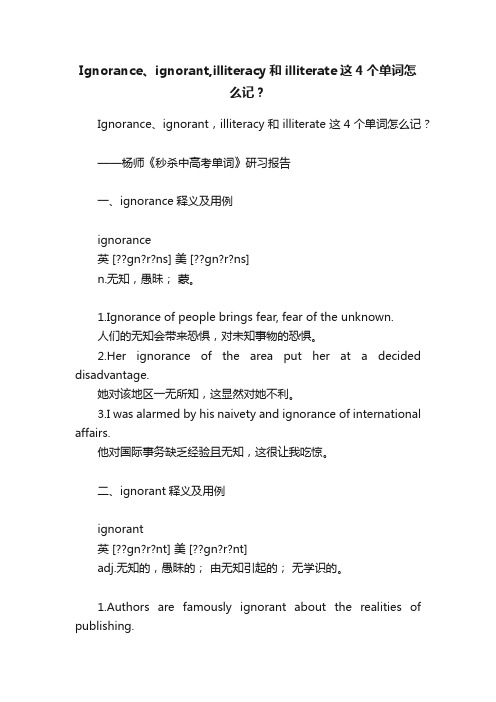
Ignorance、ignorant,illiteracy和illiterate这4个单词怎么记?Ignorance、ignorant,illiteracy和illiterate这4个单词怎么记?——杨师《秒杀中高考单词》研习报告一、ignorance释义及用例ignorance英 [??gn?r?ns] 美 [??ɡn?r?ns]n.无知,愚昧;蒙。
1.Ignorance of people brings fear, fear of the unknown.人们的无知会带来恐惧,对未知事物的恐惧。
2.Her ignorance of the area put her at a decided disadvantage.她对该地区一无所知,这显然对她不利。
3.I was alarmed by his naivety and ignorance of international affairs.他对国际事务缺乏经验且无知,这很让我吃惊。
二、ignorant释义及用例ignorant英 [??gn?r?nt] 美 [??ɡn?r?nt]adj.无知的,愚昧的;由无知引起的;无学识的。
1.Authors are famously ignorant about the realities of publishing.作者们不了解出版界的实际情况,这是人所共知的。
2.People don't like to ask questions for fear of appearing ignorant.人们不喜欢问问题,害怕自己会显得很无知。
3.Many people are worryingly ignorant of the facts about global warming.许多人竟然不知道地球变暖的事实,实在令人担忧。
三、illiteracy释义及用例illiteracy英 [?'l?t?r?s?] 美 [??l?t?r?si]n.文盲,无知,缺乏教育。
新编英语教程6 unit 10
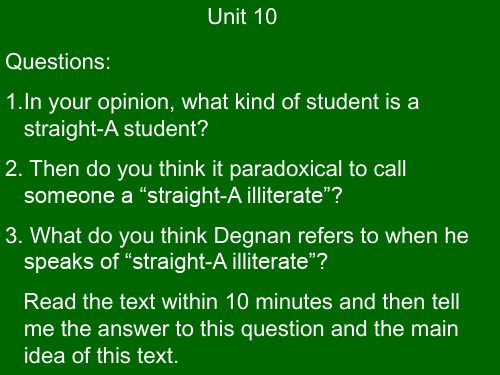
Possible answer to the 3rd question:
The title of the essay seem strange and even paradoxical to us. This special group of illiterate people includes straight-A students in college, Ph.D. candidates, and even certain highly successful professors. They are illiterate not in the ordinary sense of the word, but in the sense that they can not say or write in plain/ simple English. The reason, as the author argues, is to be found in the textbooks these straight-A students are forced to read through years of higher education, which are filled with professional jargons and gibberish writing.
a coveted fellowship: a fellowship (i.e. the money given to postgraduate students to allow them to continue their studies at an advanced level) that everyone longs jealously to possess. 5. allegorically: figuratively allegory: (1) an allegory is a form of imaginative literature constructed in such a way that their readers are encouraged to look for meanings hidden beneath the literal surface of the fiction. (Encyclopaedia Britannica) (2) An allegory is a narrative in which the characters, events, and setting represent deeper
straight_A_illiteracy__全A_文盲[1] 翻译
![straight_A_illiteracy__全A_文盲[1] 翻译](https://img.taocdn.com/s3/m/0d1efe16a6c30c2259019e1d.png)
全A 文盲1尽管我们学校为数众多的普通文盲目前得到极大的关注,但是,我们却忽略了另一类文盲,这类文盲的困境,在从很多方面来讲,更加事关重大,因为他们更具有影响力。
这类文盲通常是一位大学的校长,但他也是位典型的博士、成功的教授和教科书作者。
我把这个人称为全A文盲,蔚蓝给予全A文盲和普通文盲一样的关注,才有了下文。
2以下的场景是我的办公室,我正在工作,做着协助治疗全A文盲(多年来我一直这样称呼这种病症)所必须做的事。
我对一篇学生论文进行询问。
查证,深入探求他的含义。
这是位平均成绩全A的大四学生,聪明绝顶、口齿伶俐,刚获得一所全国重点研究生院提供的令人羡慕的奖学金。
他和我一直在一句一句地、一字一字地分析这论文,已经进行了一个小时。
“有关多种共线外因变量的选择”,我默念着他的论文,“视某些多种相互关联的共同作用系数的衍生情况而定”。
我停下来喘了口气。
“那么看看这句话,”我询问这个学生(我讽喻寓言式地称呼他为聪明先生),“这句话,聪明先生,究竟是什么意思啊?”聪明先生锁眉苦思。
最终,结合了我们的语言学知识和想象力,又用了好像一个小时似的,终于破译了这句话。
我们搞清楚了聪明先生究竟试图表达的是什么,他真正想说的是什么,那就是:“供给决定需求”。
3在过去的大约十年间,我认识了许多像他这样的学生,许多大四学生都患上了这种聪明病。
侵袭了最优秀的心灵,逐渐摧毁批判的能力,使得他们丧失了发现自己或别人文章中那些莫名其妙、毫无意义的话的本领。
在高等教育期间,这种病更加恶化,特别是一般在受害者拿到博士学位的时候,进入晚期、显然,聪明病的受害者不是普通的文盲病。
他提交的论文里从来不会有拼写错误或标点错误;他从不使用双重否定或“irregardless”这样的词语(译者按:无论在标准或非标准变化体中都没有这个词真正的前身。
该词可能把“irrespective”和“regardless”合在一起生造出来的。
也许这就是为什么批评者们有时候坚持认为“没有irregardless”这么个词的原因)。
unit5 Straight-A Illiteracy
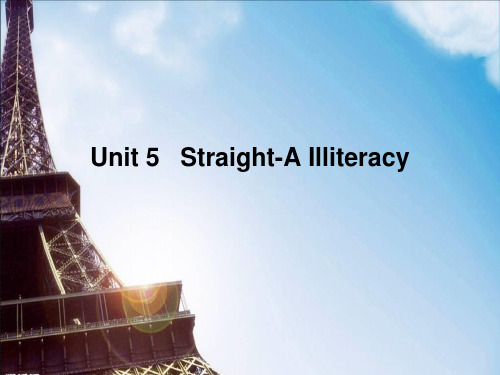
• 5.coveted: (adj.) eagerly wished for or desired. • Eg: she won the coveted first prize at the speech contest, much to our surprise. • covet v. have a very strong desire to have sth that someone else has 垂涎,觊觎
• straight-A student: He/She is a student who gets As for all the courses he/she takes. • illiteracy: someone who has not learned to read or write.
• Library Work • 1. 1) An allegory is a form of imaginative literature constructed in such a way that their readers are encourage to look for meanings hidden beneath the literal surface of the fiction. • 2) An allegory is a narrative in which the characters, events, and setting represent deeper truths or generalizations than those suggested by the surface story. • 3) An allegory is a broad term covering any piece of writing or image which has meanings additional to the literal sense.
unit 10 Straight-A Illiteracy
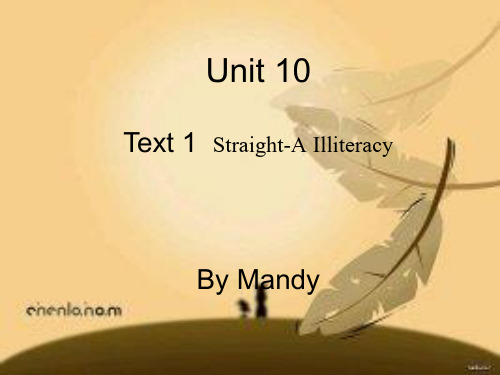
excitement, or anxiety, etc.不必要的关注,激动,焦虑等 常用短语 1)make a fuss(about sth)制造麻烦 eg. They want quiet wedding without making any fuss.
2)make a fuss of sb: to pay a lot of attention to sb.关注 eg. They like to be flattered and made a fuss of. 3)fuss over sth/sb: to pay too much attention or worry about them too much.过于担心 eg. She was inclined to fuss over her health.
3.overpopulate: to have too large a population;
本文中指数目十分巨大
4. In an attempt to do sth
表示意图和动机 eg. In an attempt to familiarize myself with the campus, I suggested that we should go out for a walk. Attempt和动词不定式搭配或者介词at使用 eg. All attempts to control inflation have failed.
5.allegorically: figuratively 6.gibberish: talk or writing containing many obscure, pretentious, or technical words; meaningless or unintelligible talk and writing. 7.providentially:fortunately, luckily. 8.inexorably:inescapably. 9.profundity:profound or deep matters. 10.grapple with: try to deal with.
Unit 5 straight a illiteracy

Make one’s writing clean, clear and concise by avoiding high-sounding, elevated language.
articulate: able to express thoughts and feelings clearly and effectively. Eg. She is among the few articulate children in the nursery. coveted (adj.): eagerly wished for or desired. Eg. She won the coveted first prize at the speech contest, much to our surprise.
way of organizing his essay to attain the aim:
• The first paragraph, defines the term straight-A illiteracy, which is highly necessary as it is a phenomenon little thought-of by the general public, and besides, the term itself is apparently paradoxical. • In the second paragraph Degnan uses his personal experience as an example to illustrate the definition he has given in the first paragraph. • If we take what he has narrated in the second paragraph as a specific instance of straight-A illiteracy, the third paragraph is a generalization of the phenomenon. • The cause stated in the concluding paragraph is suggested in the third paragraph with the sentence "Taking his cue from years of higher education, years of reading the textbooks and professional journals that are major sources of his affliction . . . ."
新编英语教程6Unit10教案
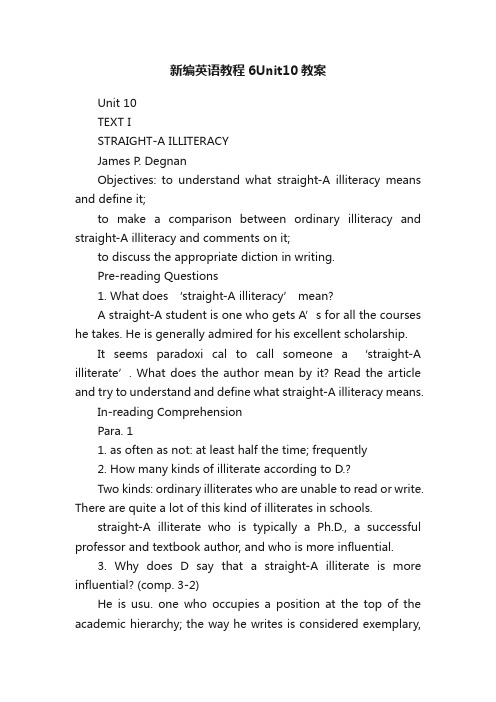
新编英语教程6Unit10教案Unit 10TEXT ISTRAIGHT-A ILLITERACYJames P. DegnanObjectives: to understand what straight-A illiteracy means and define it;to make a comparison between ordinary illiteracy and straight-A illiteracy and comments on it;to discuss the appropriate diction in writing.Pre-reading Questions1. What does ‘straight-A illiteracy’ mean?A straight-A student is one who gets A’s for all the courses he takes. He is generally admired for his excellent scholarship.It seems paradoxi cal to call someone a ‘straight-A illiterate’. What does the author mean by it? Read the article and try to understand and define what straight-A illiteracy means.In-reading ComprehensionPara. 11. as often as not: at least half the time; frequently2. How many kinds of illiterate according to D.?Two kinds: ordinary illiterates who are unable to read or write. There are quite a lot of this kind of illiterates in schools.straight-A illiterate who is typically a Ph.D., a successful professor and textbook author, and who is more influential.3. Why does D say that a straight-A illiterate is more influential? (comp. 3-2)He is usu. one who occupies a position at the top of the academic hierarchy; the way he writes is considered exemplary,and his judgment of what is appropriate is directive.4. What do people do with these two kinds of illiterate?More concern has been shown for the ordinary illiterates. People even make fuss about this kind of illiteracy. However, little attention is aroused to straight-A illiterates. So, the purpose of this article is to give them as much attention as has been paid to ordinary illiterates. (ll. 6-7)Para. 21. What is this para. about?D’s treatment with a disease of straight-A illiteracy in his office.2. Do you think D’s comparison of straight-A illiteracy to a disease is appropriate? Explain. (comp. 3-3)Yes. Like a disease, it victimizes healthy persons; it has its symptoms, and its agents.3. Who is the straight-A illiterate?a college senior ... outstanding graduate schools.He is extremely clever and highly talented in language. He has done an excellent job in his studies, so he has been awarded an opportunity to further his study in one of the nation’s best graduate schools.4. How does the treatment go?They have been going over the student’s paper sentence by sentence, word by word for an hour, prying and probing for its meaning.‘Prying and probing’, the repetition of the same structure, is to emphasize the extreme difficulty of the task.5. Are there any other words to highlight the extreme difficulty in understanding Mr. Bright’s paper? (comp. 3-4) interrogating, cross-examining, pause to catch my breath, onearth, his brow furrowed, tries mightily, finally ... finally, another hour, decode ....6. Try to explain why the following pairs of sentences are the same in meaning: ll. 15-17, ll. 23 (comp. 3-8)As intended by the student, ‘The choice ... multi-colinearity’ corresponds to ‘demand’ while ‘... the derivations ... coefficients’ corresponds to ‘supply’.This is a very abstruse sentence to unravel.7. Why does D insert the word ‘allegorically’ in ‘... whomI call, allegorically,Mr. Bright’? (comp. 3-5)‘allegory’ in Lib. Work.When the author calls his student Mr. Bright allegorically, he does not mean to refer to this particular straight-A student only. He is using the term to cover all those students, college seniors, and Ph.D.’s who may seem bright when judged by their academic records, but who nevertheless fail to detect gibberish in their own writings or in those of others.The student given the name Mr. Bright thus becomes a symbol.Is he really bright? No, here in an ironical sense.Para. 31. It attacks best minds, ... in that of others.It does harm to the most intelligent individual and, by and by, wears away his ability to judge, eventually reducing him to being unable t Para. 3o detect nonsense either in his own writing or in that of others.This is the harm that straight-A illiteracy does to people.2. Reword the following sentences so that they are moreeasily understood: ll. 34-35, ll. 37-41 (comp. 3-9)ll. 34-35: The shop assistants had better have in stock what our customers need, or we won’t be in business long (= This is said or written by an ordinary illiterate, who is poor at spelling (them), pronunciation, punctuation, grammar (had + better, stock -up on, ain’t gonna be). So he makes many mistakes, and so he is kept out of institutions of higher learning. (l. 33)ll. 37-41: You must focus your attention on what your customers need so that you are able to tell what is necessary from what is unnecessary when you replenish your stock.This is written by a straight-A illiterate, who would never make spelling, grammar, punctuation mistakes, but who is incapable of making his ideas simple and clear in his writing. However, it is for writing this gibberish that he can be awarded straight As on his papers and the opportunity to continue his study, receiving higher and higher education until he has successfully got the Ph.D.The higher education one receives, the more serious his disease of straight-A illiteracy becomes. (ll. 27-28)3. Make complete the elliptical se ntence ‘Not our man’. What is the function? (comp. 3-6)‘This is not what our man would say’. This ellipsis contrasts the two types of illiteracy, and with it D turns back from one type to the other.Para. 41. What is the major cause of straight-A illiteracy?the stuff - the textbooks and professional journals that the straight-A illiterate is forced to read during his years of higher education.He reads gibberish, and gradually he forms a habit of writing gibberish himself, which he has been instructed to learn an exemplary writing of sophisticated taste. (ll. 46-47)2. Give the examples of gibberish D quotes from professional journals.jargons as ‘ego-integrative action orientation’ and ‘orientation toward improvement of the graficational-deprivation bala nce of the actor’‘homologous’ or ‘isomorphic’, meaning ‘alike’‘allotropic’, meaning ‘different’‘dichotomize’ or ‘bifurcate’, meaning ‘divide anything3. D concludes his article by using quite a number of unintelligible words and expressions in place of clear and simple English. Is it effective? Why?This usual arrangement has undoubtedly enabled the reader once again to feel even more the absurdity of the practice to express simple ideas in an almost incomprehensible way, adding more weight to the point he intends to make. (Analysis) Post-reading Discussion1. Makeadefinition of ‘straight-A illiteracy’. (comp. 1-A)2. What is the purpose of D’s writing? (comp. 3-1)to find the cause of straight-A illiteracy.to give straight-A illiterate equal time with his widely publicizedcounterpart. (para. 1)to expose and condemn the use of professional jargon, which fills the reading materials that highly educated people are forced to read as they pursue their education. (Analysis)3. Comp. 24. Group work: Compare briefly the two types of illiteracy.Which type in your opinion presents a graver problem to society? (comp. 3-10)TEXT IITHE QUALITIES OF GOOD WRITINGJacqueline Berke1. This is an excerpt from Twenty Questions for the Writer, a widely used writing textbook, the kind of which we need to read to further our learning by ourselves. What do you usu. do when you read this kind of book by yourselves? Underline or highlight the important words or sentences, or make notes of your own so as to get the gist of it. Suppose you have borrowed this book from the library and come to read this part. What will you do with it? Study the text individually before class and do what you usu. do to catch the gist.2. Have group work for about 20 mins., exchanging what you have learned after reading it, and preparing for a presentation of this text. Your presentation can be based on Questions 1, 2, & 4 on p165.3. Presentation: Ask 4 groups to present the three qualities and human nature of writing respectively.4. As college seniors, we need to choose those more specific, exact, meaningful words in our writing rather than those common words as ‘good’, ‘nice’, etc. Do you consider using those more specific, exact, meaningful words as a kind of straight-A illiteracy? Give your opinions.。
高级英语第六版unit-5-straight-A-illiteracy
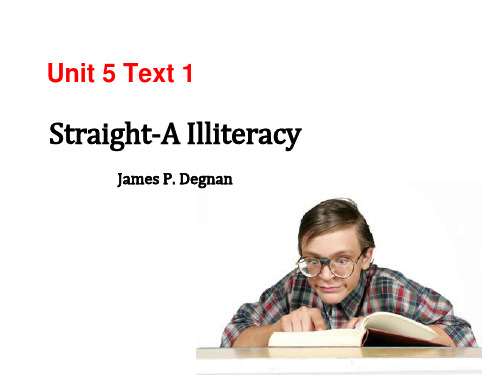
publicized counterpart the ordinary illiterate who are
widely known to the public
P2
Questions: 1. Is it appropriate to compare straight-A illiteracy to a disease? 2. Can you find any special sentence structures in P2? Why does
Unit 5 Text 1
Straight-A Illiteracy
James P. Degnan
Plain English
team work
A game: running dictation
Rules:
1. one student at a time memorize one sentence (no paper or pen)
2. tell other students the sentence and another student write it down
3. try to get it as accurate as possible
Plain English
Plain English is a term for communication in English that emphasizes clarity, brevity, and the avoidance of technical language. The goal is to write in a way that is easily understood by the readers: clear and straightforward, appropriate to their reading skills and knowledge.
高级英语Straight-AIllitaracy
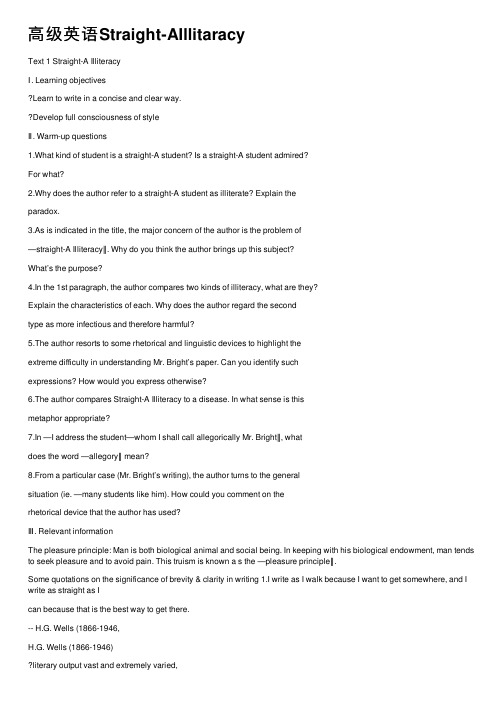
⾼级英语Straight-AIllitaracyText 1 Straight-A IlliteracyⅠ. Learning objectivesLearn to write in a concise and clear way.Develop full consciousness of styleⅡ. Warm-up questions1.What kind of student is a straight-A student? Is a straight-A student admired?For what?2.Why does the author refer to a straight-A student as illiterate? Explain theparadox.3.As is indicated in the title, the major concern of the author is the problem of―straight-A Illiteracy‖. Why do you think the author brings up this subject?What’s the purpose?4.In the 1st paragraph, the author compares two kinds of illiteracy, what are they?Explain the characteristics of each. Why does the author regard the secondtype as more infectious and therefore harmful?5.The author resorts to some rhetorical and linguistic devices to highlight theextreme difficulty in understanding Mr. Bright’s paper. Can you identify suchexpressions? How would you express otherwise?6.The author compares Straight-A Illiteracy to a disease. In what sense is thismetaphor appropriate?7.In ―I address the student—whom I shall call allegorically Mr. Bright‖, whatdoes the word ―allegory‖ mean?8.From a particular case (Mr. Bright’s writing), the author turns to the generalsituation (ie. ―many students like him). How could you comment on therhetorical device that the author has used?Ⅲ. Relevant informationThe pleasure principle: Man is both biological animal and social being. In keeping with his biological endowment, man tends to seek pleasure and to avoid pain. This truism is known a s the ―pleasure principle‖.Some quotations on the significance of brevity & clarity in writing 1.I write as I walk because I want to get somewhere, and I write as straight as Ican because that is the best way to get there.-- H.G. Wells (1866-1946,H.G. Wells (1866-1946)literary output vast and extremely varied,perhaps best remembered for his scientific romances, among the earliest products of thenew genre of science fiction. (e.g. The T ime Machine, The First Men in the Moon. AModern Utopia )2.I have made this letter longer than usual because I lack the time to make itshorter.– Pascal (Provincial Letters (1657)Blaise Pascal (1623-62)French mathematician, physicist, and moralist,as gifted in science as in letters.literary fame resting on two works, Provincial Letters (1656-7) (Les Provinciales3. I n order to speak short on any subject, think long.Brackenbridge (Modern Chivalry,1792) Hugh Henry Brackenbridge (1748-1816)American novelist, poet, lawyerModern Chivalry (1792, satirical novel, published in installment from1792-1815, giving a good description of men and manners during the early days of the American republic and manifesting Brackenbridge allegiance to the robust tradition of the English novel in Smollett and Fielding)4.“If I’d had more time, I’d have written a shorter book.”Mark Twain5.The more you say, the less people remember. The fewer the words, the greaterthe profit. ---- FenelonSumming up the key ideas:Make your writing clean, clear and concise.1. Writing in clear and concise EnglishTastes may change in language, but some basic principles of good writing have remained unchanged. Among them are principles of Accuracy, Brevity and Clarity, appropriately abbreviated into ABC. Of the three principles, the one that relates most directly to the goal of communication is Clarity. When you write, you need to let your readers know from the very beginning what you want to say. Y ou need not attempt to dazzle them with multi-syllable words and long, involved sentences. Graceful phrasing certainly contributes to good writing, but you need to strive first for clarity. It is ill-mannered to make your readers rack their brains trying to understand you. Nothing will annoy readers more than having to waste their time plowing through a cluttered paragraph because you neglected to spend your time cleaning it up.In the text, Orwell argues that we can improve our writing by getting rid of hackneyed metaphors, long-winded expressions and vague, high-sounding words. Be very careful, then, with over-used expressions such as the following:Hackneyed metaphors:as busy as a beeby leaps and boundsas clear as crystalface the musicplay with fireas cool as a cucumberlike a needle in a haystackClichéslast but not leastlucky dog,no pain; no gaina piece of cakefrom the bottom of my heartfrom every walk of lifethe other side of the coinfew and far betweenBite off more than you can chew.Big, long wordsendeavor (attempt, try)repercussions (results / effects)transmit (send)materialize ( happen, occur)commence (begin, start)blueprint (plan)terminate (end)assistance (help)expenditure (cost)necessitate (need, demand)indebtedness (thanks, gratitude)Circumlocutionsa limited number (few)a sizable percentage of … (many)be of the opinion that … (think)Archaismprior to (before)as per (according to)2. Using the right wordWords are many and it is not always easy choosing the right one. First, words that look similar may have different meanings. For example: human: of, or relating to man (⼈的), as inhuman being; human nature; human rightshumane: be characterized by kindness, mercy, or compassion (仁慈的), as ina humane judge/office; a humane killer(V ery different from a humankille r!)singularity: (of mind) oddity, peculiarity, something that singles a person outfrom others (思想奇特、古怪)singleness: (of mind) holding steadfastly to the purpose in mind, withoutbeing drawn aside by less worthy objects (思想专⼀、坚定)Secondly, words that have the same or similar meaning may carry different associations. For example, the following five words are similar in meaning but different in connotation.happiness:joy:delight:rapture:ecstasy:Thirdly, words that have the same meaning may be used in different situations and different styles. For example, in each of the following sets, words of the same notion are used at different levels of formality.poor face beginpoverty-stricken mug commencepenniless visage inauguratebroke initiateIn addition, there are cultural differences in word choice.We need to think about the various aspects of a word when deciding which to choose. Choosing the right word is, therefore, a process of clarifying and defining our thoughts. Unless we have found the exact words to verbalize our own thoughts, we can never be very sure of what our thoughts are. Without words, our thoughts can not be defined or stated in a clear and precise manner.1. Diction:As you search the right word,be careful about words that sound grand but have vague meanings.Avoid elevated language if you can say the same thing clearly and plainlywithout it.Avoid jargon:Jargon usually means pretentious language used by people to make themselves sound smarter than anybody else. Suchlanguage is always ineffective because it sets up a barrier to communication.Jargon can also refer to language used with a trade or profession which is understood perfectly well among that specialized group but not by outsiders.Bridge players mean something entirely different by ―rubber‖, ―dummy‖ and ―slam‖ than the rest of us do.Consider your audience and your purpose. If your readers are familiar with the jargon, and if it is the best way to make your meaning clear, use it.The kind of jargon you should try to avoid includes those monstrous new phrases that creep into the language via the federal bureaucracy, the educational establishment, and the social sciences – phra ses like ―to facilitate the availability of funds‖(meaning ―to help get money‖ )2. At sentence level:Guard against lazy wordinessNothing will annoy readers more than having to waste their time plowing through a cluttered paragraph because you neglected to spend your time cleaning it up.Avoid old-fashioned expressions:Compare the following pairs of expressions:Practice1.Tidy the following littered sentences. Keep the same meaning but eliminate the verbiage:Example:It is believed by a number of persons in this country that the young people of today donot assume as much responsibility toward society as it might be hoped that they would.(33 words)(Revised) T oday many believe that our young people assume too little responsibilitytoward society. (13 words)1)It has been in the most recent past that society has viewed the poor as being closely akinto the criminal.2)There came a time when there was a feeling that, at least on my part, based upon w hat Ihad been reading, the food we buy at the supermarket to eat is genuinely poisonous.3)In my opinion there are many diverse elements about this problem that we probablyought to think about before arriving at an opinion on this terribly complex matter.4)Government policy-makers should as a matter of course consider the widely varied anddiverse opinions of those qualified people outside government, as well as the ideas of people in their own departments and agencies.5)We stand ready, willing and able to be of assistance and service to you in the near future.2.Translate the following into plain English. Avoid vague expressions.1)The city budget proposes money for effective confinement andextinguishments of unwanted and destructive fires.2)The new economic sta tistics validated the essentiality of the President’sstruggle to cut the inflation rate.3)If we find the reasonable probability of repayment is slipping away from us,then we will have to respond in terms of extension of future credit. (Hint: Y ourfriendly banker might say this to you as a warning.)4)We have exceptional game plan capabilities together with strict concerns forprogramming successful situations. (Hint: This means ―Buy stock from us.‖) Reference answers:1)It has been in the most recent past that society has viewed the poor as being closely akinto the criminal.The poor are now viewed as criminals.Now society views the poor as criminals.2)There came a time when there was a feeling that, at least on my part, based upon what Ihad been reading, the food we buy at the supermarket to eat is genuinely poisonous.I often feel that food bought at the supermarket is poisonous.3)In my opinion there are many diverse elements about this problem that we probablyought to think about before arriving at an opinion on this terribly complex matter.I think there are many different elements to consider before coming to aconclusion.4)Government policy-makers should as a matter of course consider the widely varied anddiverse opinions of those qualified people outside government, as well as the ideas of people in their own departments and agencies.Government policy-makers should consider the various opinions of those insideand outside the government.5)We stand ready, willing and able to be of assistance and service to you in the near future.We are ready to help you.We hope to offer you service in the future.3.Translate the following into plain English. Avoid vague expressions.1)The city budget proposes money for effective confinement and extinguishments ofunwanted and destructive fires.The city budget proposes money for fire fighting/precautions2)The new economic statistics validated the essentiality of the President’s struggle to cutthe inflation rate.The new economic statistics proved that it is important for the President to cutthe inflation rate.3)If we find the reasonable probability of repayment is slipping away from us, then we willhave to respond in terms of extension of future credit. (Hint: Y our friendly banker might say this to you as a warning.) If we find you unable to repay us, we will give you an extension.4)We have exceptional game plan capabilities together with strict concerns forprogramming successful situations. (Hint: This means ―Buy stock from us.‖)We are good at designing strategic plans to ensure success. (Implications: If youbuy stock (股票)from us you are sure to get profits.)Ⅳ. Language points1.fuss and bother about sth.:to make a fuss of sb.: to pay a lot of attention to sb.They like to be flattered and made a fuss of. 喜欢受⼈呵护to fuss over sb./sth.: to pay too much attention or worry about them too much e.g.-- She was inclined to fuss over her health.-- A fussy person is one who makes a lot of ado about unimportant things.2. overpopulate: to have too large a population; (text)their number is very large.3. plight: difficult situation, full of problemseg. -- the plight of the handicapped-- The children were in a sorry plight; tired, lost, and hungry.4. as often as not:in roughly half the instances 多半/往往at least half the time;frequently5. interrogate: question sb. closely, thoroughly, formally6. pry:try to find out about sb. else’ private affairseg. –I’m not trying to pry.-- Don’t go prying into my affairs.7. probe: ask questions; make inquiries into; try to find outeg. – to probe for information-- to probe the mysteries of the universe8. exogenous: growing or originating from outside9. co linearity: in lines10. be contingent upon: depend upon/be decided by11. co efficient: (math) 系数eg. 4x12. decode: to decode a telegram/a message, to change it into ordinary language13. fellowship: money given to postgraduate students to allow them to continue their studies at an advanced level14. gibberish: unintelligible or meaningless speech, nonsense. ie. containing many obscure, pretentious, or technical words; meaningless or unintelligible15. providential: a. lucky b. of or by divine foresight the protective care of God or natureprovidence: -- God in this aspect-- timely care or preparation16. protect/guard/shelter/screen from/against:eg. – May God protect you from harm.-- Y ou can’t protect him from blame in the accident.-- It is hopeless trying to protect your child from the harmful effects of TVuntil the material improves.-- to protect from sudden attacks17. afflict: pain/illness/sorrow ~ sb. means to affect them and makethem suffer eg. sb. be afflicted with blindness; (text) affliction ofthe Bright disease18. entrepreneur: a person who undertakes an enterprise or business with the chance of profit of loss19. filter: a porous device for removing impurities or solid particles from a liquid of gas passed through it20. inexorable: a. relentless b. (of a person or attribute) that cannot be persuaded by request or entreatyeg. – to wage an ~ struggle against fascism 对…坚决的⽃争-- an ~ law 不可抗拒的法律-- History is ~. 历史是⽆情的。
straightAilliteracy全A文盲翻译
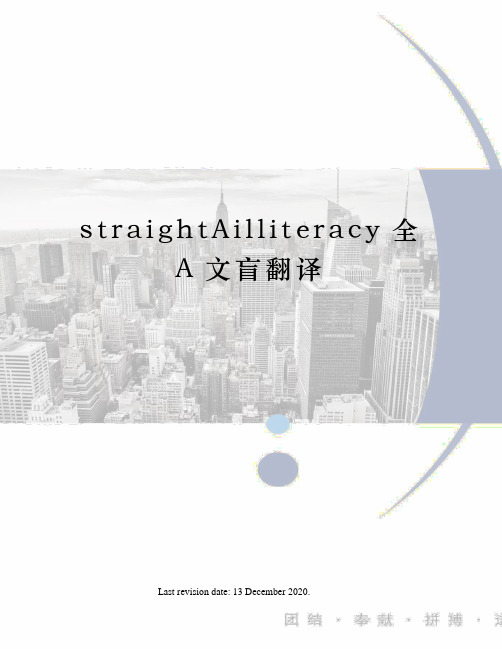
s t r a i g h t A i l l i t e r a c y全A文盲翻译Last revision date: 13 December 2020.全A文盲1尽管我们学校为数众多的普通文盲目前得到极大的关注,但是,我们却忽略了另一类文盲,这类文盲的困境,在从很多方面来讲,更加事关重大,因为他们更具有影响力。
这类文盲通常是一位大学的校长,但他也是位典型的博士、成功的教授和教科书作者。
我把这个人称为全A文盲,蔚蓝给予全A文盲和普通文盲一样的关注,才有了下文。
2以下的场景是我的办公室,我正在工作,做着协助治疗全A文盲(多年来我一直这样称呼这种病症)所必须做的事。
我对一篇学生论文进行询问。
查证,深入探求他的含义。
这是位平均成绩全A的大四学生,聪明绝顶、口齿伶俐,刚获得一所全国重点研究生院提供的令人羡慕的奖学金。
他和我一直在一句一句地、一字一字地分析这论文,已经进行了一个小时。
“有关多种共线外因变量的选择”,我默念着他的论文,“视某些多种相互关联的共同作用系数的衍生情况而定”。
我停下来喘了口气。
“那么看看这句话,”我询问这个学生(我讽喻寓言式地称呼他为聪明先生),“这句话,聪明先生,究竟是什么意思啊”聪明先生锁眉苦思。
最终,结合了我们的语言学知识和想象力,又用了好像一个小时似的,终于破译了这句话。
我们搞清楚了聪明先生究竟试图表达的是什么,他真正想说的是什么,那就是:“供给决定需求”。
3在过去的大约十年间,我认识了许多像他这样的学生,许多大四学生都患上了这种聪明病。
侵袭了最优秀的心灵,逐渐摧毁批判的能力,使得他们丧失了发现自己或别人文章中那些莫名其妙、毫无意义的话的本领。
在高等教育期间,这种病更加恶化,特别是一般在受害者拿到博士学位的时候,进入晚期、显然,聪明病的受害者不是普通的文盲病。
他提交的论文里从来不会有拼写错误或标点错误;他从不使用双重否定或“irregardless”这样的词语(译者按:无论在标准或非标准变化体中都没有这个词真正的前身。
高级英语教学大纲

《高级英语》教学大纲一、课程基本信息课程名称:高级英语课程类别:(1)课程模块:专业核心(2)课程属性:必修。
学分/学时:总160学时(10学分),其中理论学时:156 实践学时:4适用对象:英语专业开课单位/教研室:外语系二、课程设置目的与教学目标1、课程设置目的:高级英语是英语语言文学专业高年级阶段的一门理论与实践相结合的专业必修课,课程对象为英语专业三、四年级学生。
本课程旨在通过听说读写译五项技能的综合训练,提高学生的听力水平,阅读理解能力、语法修辞、写作能力和即席发言、连贯表达乃至辩论能力。
课程通过阅读和分析内容广泛的材料,提高学生的阅读速度和词义辨析能力,扩大学生知识面,加深学生对社会和人生的理解,培养学生对语篇的分析和鉴赏能力、逻辑思维与独立思考能力,巩固和提高学生的英语语言技能,尤其是语言应用能力。
2、教学目标:通过高级英语课教学,学生应达到高等学校外语专业教学指导委员会修订的《高等学校英语专业英语教学大纲》所规定的要求:认知词汇达10000以上,能正确而熟练地使用其中5000多个单词及其最常用的搭配;能熟练掌握句子之间和段落之间的各种衔接手段,连贯地表达思想;能读懂一般英美报刊杂志上的文章、英语国家出版的有一定难度的历史传记和文学作品,能分析文章的思想观点、语篇结构、语言特点和修辞手法等。
高级英语课程教学的重点在于提高学生阅读理解和词汇运用能力,即能掌握和使用所学词汇,特别是同义词、近义词的区分和使用;正确理解文章的内容和主题思想,抓住文章的要点,分析文章的结构、语言技巧和修辞特点;提高学生的语言表达能力,能用英语解释文章中的难句、要点;提高学生逻辑思维和判断评述能力,能用英语归纳文章的主题思想,并能对文章的内容进行简单的分析、评论。
三、教学内容及要求四、教学基本要求《高级英语》课程是《基础英语》课程的延续,对学生的听、说、读、写、译等技能提出更高的培养要求。
本课程不同于《基础英语》的是它更注重阅读和写作技能的训练,更强调加强学生的创造力,要求学生从有控制的联系过渡到自然的交际。
文盲的英语单词
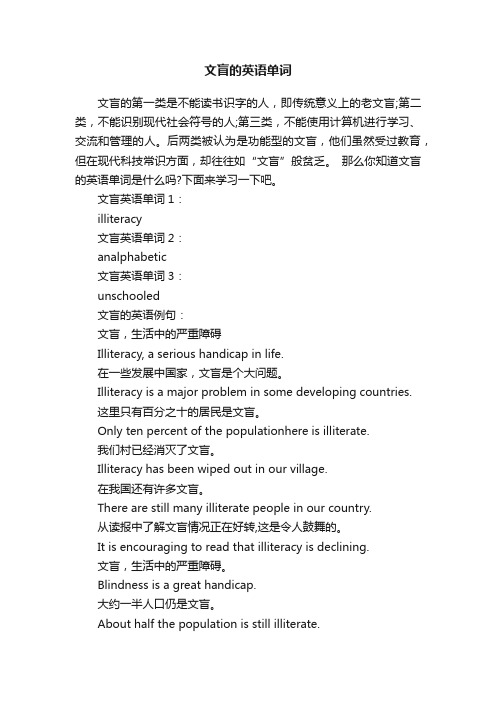
文盲的英语单词文盲的第一类是不能读书识字的人,即传统意义上的老文盲;第二类,不能识别现代社会符号的人;第三类,不能使用计算机进行学习、交流和管理的人。
后两类被认为是功能型的文盲,他们虽然受过教育,但在现代科技常识方面,却往往如“文盲”般贫乏。
那么你知道文盲的英语单词是什么吗?下面来学习一下吧。
文盲英语单词1:illiteracy文盲英语单词2:analphabetic文盲英语单词3:unschooled文盲的英语例句:文盲,生活中的严重障碍Illiteracy, a serious handicap in life.在一些发展中国家,文盲是个大问题。
Illiteracy is a major problem in some developing countries.这里只有百分之十的居民是文盲。
Only ten percent of the populationhere is illiterate.我们村已经消灭了文盲。
Illiteracy has been wiped out in our village.在我国还有许多文盲。
There are still many illiterate people in our country.从读报中了解文盲情况正在好转,这是令人鼓舞的。
It is encouraging to read that illiteracy is declining.文盲,生活中的严重障碍。
Blindness is a great handicap.大约一半人口仍是文盲。
About half the population is still illiterate.这将有助于消除文盲和疾病,但也会扰乱传统的生活方式。
It would help to end illiteracy and disease, but it would also dislocate a traditional way of life.2010年的海地大地震夺去了25万多人的性命,而现在,夏普需要说服连银行账户都没有的海地人民(其中有很多人还是文盲)去迎接一个崭新的数码时代,接受他的公司所提供的移动金融服务,而且这种服务甚至比北美和欧洲的同类服务还要更复杂、更先进。
新编英语教程6 练习与答案
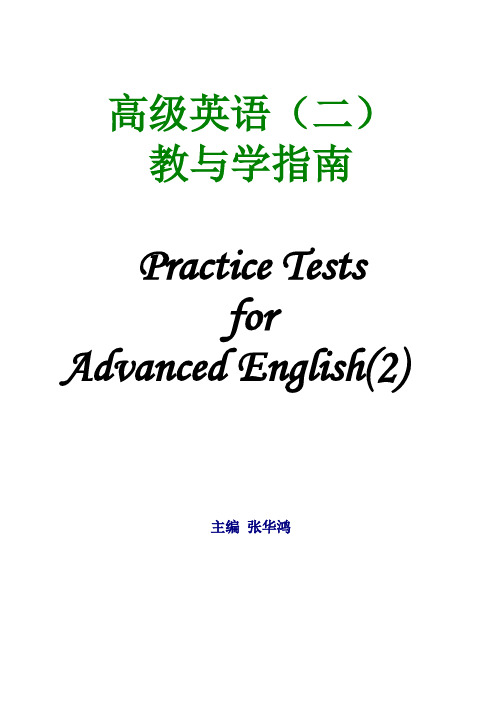
高级英语(二)教与学指南Practice Testsfor Advanced English(2)主编张华鸿前言编写本书的目的:目前英语专业三年级所使用的由上海外国语大学李观仪教授主编的〈新编英语教程〉第五、六册本书的主要特点:1.紧扣精读课文编写练习,实用性、针对性强。
2.对于同义词辨析的练习配以详尽的解释和相应的例句,旨在帮助学生真正弄懂并掌握这些词的用法。
3.设计了旨在提高学生语言运用熟练程度的系列练习,分别为:一、英语释义二、英语句型转换三、汉译英四、完形填空五、成段改错4.练习均配有参考答案。
本书由张华鸿主编。
高华老师负责编写同义词辨析部分;郑艳丽老师负责编写句型转换部分;张华鸿老师负责编写英语释义、汉译英、完形填空和成段改错四部分,以及全书的编排、设计、整合与审编定稿等工作。
本书承华南师范大学外国语言文化学院领导的大力支持,以及英语系高年级教研室全体同仁的热心帮助,编者在此表示衷心的感谢。
编者2003年1月于华南师范大学外文学院ContentsUnit One: VESUVIUS ERUPTS 3 Unit Two: THE FINE ART OF PUTTING THINGS OFF16 Unit Three: WALLS AND BARRIERS28 Unit Four: THE LADY,OR THE TIGER?40 Unit Five: THE LADY,OR THE TIGER?53 Unit Six: DULL WORK65 Unit Seven:BEAUTY 74 Unit Eight: APPETITE84 Unit Nine: A RED LIGHT FOR SCOFFLAWS98 Unit Ten: STRAIGHT-A ILLITERACY114131 Unit Eleven: ON CONSIGNING MANUSCRIPTS TOFLOPPY DISCS AND ARCHIVES TO OBLIVIONUnit Twelve: GRANT AND LEE147 Unit Thirteen: EUPHEMISM163 Unit Fourteen: THAT ASTOUNDING CREATOR---NA TURE175 Unit Fifteen: TEACHING AS MOUNTAINEERING191Unit OneTEXT IVESUVIUS ERUPTSI. Paraphrase the parts underlined in the following:So the letter which you asked me to write on my uncle’s death has made you eager to hear about the terrors and also the hazards I had to face 1when left at Misenum, for I 2broke off at the beginning of this part of my story.I took a bath, dined, and then dozed 3fitfully for a while. For several days past there had been earth 4tremors which were not particularly alarming because they are frequent in Campania: but that night the shocks were so violent that everything fell as if it were not only shaken but overturned.I don’t know whether I sh ould call this courage or 5folly on my part (I was only seventeen at the time) but I 6called for a volume of Livy and went on reading as if I had nothing else to do.Up came a friend of my uncle’s who had just come from Spain to join him. When he saw us sitting there and me actually reading, he scolded us both —me for my 7foolhardiness and my mother for allowing it.By now it was dawn [25 August in the year 79], but the light was still dim and 8faint. The buildings round us were already 9tottering, and the open space we were in was too small for us not to be in real and 10imminent danger if the house collapsed. This finally 11decided us to leave the town. We were followed by a panic- stricken mob of people wanting to act on someone else’s decision 12in preference to their own (a point in which fear looks like 13prudence), who 14hurried us on our way by pressing hard behind in a dense crowd.We also saw the sea sucked away and apparently forced back by the earthquake: at any rate it receded from the shore so that 15quantities of sea creatures were left 16stranded on dry sand. On the landward side a fearful black cloud was 17rent by forked and quivering bursts of flame, and parted to reveal great tongues of fire, like flashes of lightning magnified in size.At t his point my uncle’s friend from Spain 18spoke up still more urgently: “If your brother, if your uncle is still alive, he will want you both to be saved; if he is dead, he would want you to survive him so why put off your escape?”Soon afterwards the cloud sank down to earth and covered the sea; it had already 19blotted out Capri and hidden the promontory of Misenum from sight. Then my mother 20implored, entreated, and commanded me to escape as best I couldI looked round: a dense black cloud was coming up behind us, spreading over the earth like a flood. “Let us leave the road while we can still see,” I said, “or we shall be knocked down and 21trampled underfoot in the dark by the crowd behind.”You could hear the shrieks of women, the 22wailing of infants, and the shouting of men; some were calling their parents, others their children or their wives, trying to recognize them by their voices. People 23bewailed their own fate or that of their relatives, and there were some who 24prayed for death in their terror of dying. Many 25besought the aid of the gods, but still more imagined there were no gods left, and that the universe was plunged into eternal darkness forevermore. There were people, too, who 26added to the real perils byinventing 27fictitious dangers: some reported that part of Misenum had collapsed or another part was on fire, and though their tales were false they found others to believe them. A 28gleam of light returned, but we took this to be a warning of the approaching flames rather than daylight.I could boast that not a groan or cry of fear 29escaped me in these perils, 30had I not derived some poor consolation in my mortal lot from the belief that the whole world was dying with me and I with it.We returned to Misenum where we 31attended to our physical needs as best we could, and then spent an anxious night alternating between hope and fear.II. Rewrite the followingFor each of the sentences below, write a new sentence as close in meaning as possible to the original sentence by using the given words as the beginning.1. We were followed by a panic-stricken mob of people wanting to act on someone else’s decision in preference to their own, who hurried us on our way by pressing hard behind in a dense crowd.Panic-stricken, the mob of people close behind us ___________ _ 2. We replied that we would not think of considering our own safety as long as we were uncertain of his.Unless we were ___________________________________3. There were people, too, who added to the real perils by inventing fictitious dangers: some reported that part of Misenum had collapsed or another part was on fire, and though their tales were false they found others to believe them.By reporting that part of Misenum had collapsed or another part was on fire, _______ 4. I could boast that not a groan or cry of fear escaped me in these perils, had I not derived some poor consolation in my mortal lot from the belief that the whole world was dying with me and I with it.Because I derived some poor consolation_____________________5. Several hysterical individuals made their own and other people’s calamities seem ludicrous in comparison with their frightful predictions.Compared with several individuals’ frightful predictions, the calamities____________ III. Translate the following into English1. 还未等我们坐下来喘息,夜幕已经降临,这黑暗使你觉得不是在无月色或多云的夜晚,而像是在灯火熄灭的紧闭的房间里。
illiterate翻译
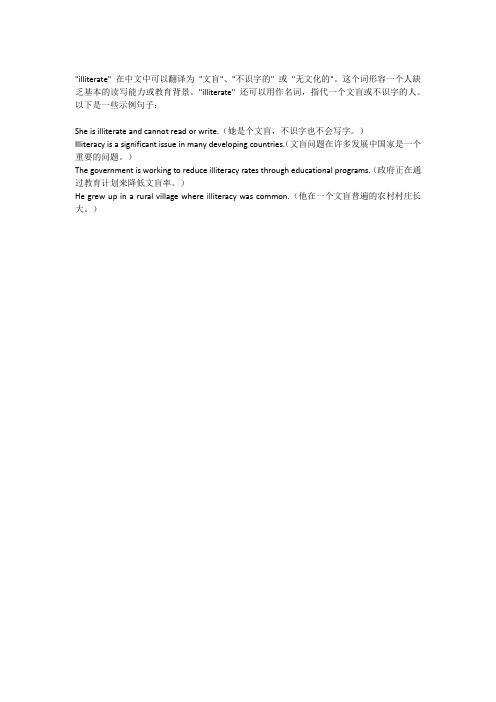
"illiterate" 在中文中可以翻译为"文盲"、"不识字的" 或"无文化的"。
这个词形容一个人缺乏基本的读写能力或教育背景。
"illiterate" 还可以用作名词,指代一个文盲或不识字的人。
以下是一些示例句子:
She is illiterate and cannot read or write.(她是个文盲,不识字也不会写字。
)
Illiteracy is a significant issue in many developing countries.(文盲问题在许多发展中国家是一个重要的问题。
)
The government is working to reduce illiteracy rates through educational programs.(政府正在通过教育计划来降低文盲率。
)
He grew up in a rural village where illiteracy was common.(他在一个文盲普遍的农村村庄长大。
)。
李观仪新编英语教程第六册unit 10 straight-A illiteracy
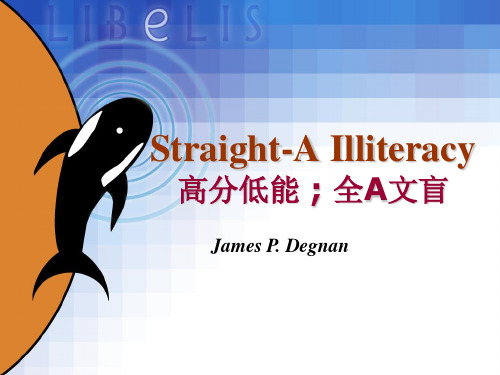
6
目前全球共有约8亿文盲,主要分布在印度、中国、 印度尼西亚、巴基斯坦、巴西、尼日利亚、埃及等 国。中国文盲总数高居世界第二位,仅次于印度。 世界上每10个文盲中就有一个以上是中国人。中国 90%的文盲分布在农村,一半文盲在西部地区,文 盲中七成是女性。
/popread/popread882.htm
How important is literacy? some quotes
7
Literacy is a bridge from misery to hope. It is a tool for daily life in modern society. It is a bulwark against poverty, and a building block of development, …… Literacy is a platform for democratization, and a vehicle for the promotion of cultural and national identity. Especially for girls and women, it is an agent of family health and nutrition. For everyone, everywhere, literacy is, along with education in general, a basic human right… Literacy is, finally, the road to human progress and the means through which every man, woman and child can realize his or her full potential.
- 1、下载文档前请自行甄别文档内容的完整性,平台不提供额外的编辑、内容补充、找答案等附加服务。
- 2、"仅部分预览"的文档,不可在线预览部分如存在完整性等问题,可反馈申请退款(可完整预览的文档不适用该条件!)。
- 3、如文档侵犯您的权益,请联系客服反馈,我们会尽快为您处理(人工客服工作时间:9:00-18:30)。
全A 文盲
1尽管我们学校为数众多的普通文盲目前得到极大的关注,但是,我们却忽略了另一类文盲,这类文盲的困境,在从很多方面来讲,更加事关重大,因为他们更具有影响力。
这类文盲通常是一位大学的校长,但他也是位典型的博士、成功的教授和教科书作者。
我把这个人称为全A文盲,蔚蓝给予全A文盲和普通文盲一样的关注,才有了下文。
2以下的场景是我的办公室,我正在工作,做着协助治疗全A文盲(多年来我一直这样称呼这种病症)所必须做的事。
我对一篇学生论文进行询问。
查证,深入探求他的含义。
这是位平均成绩全A的大四学生,聪明绝顶、口齿伶俐,刚获得一所全国重点研究生院提供的令人羡慕的奖学金。
他和我一直在一句一句地、一字一字地分析这论文,已经进行了一个小时。
“有关多种共线外因变量的选择”,我默念着他的论文,“视某些多种相互关联的共同作用系数的衍生情况而定”。
我停下来喘了口气。
“那么看看这句话,”我询问这个学生(我讽喻寓言式地称呼他为聪明先生),“这句话,聪明先生,究竟是什么意思啊?”聪明先生锁眉苦思。
最终,结合了我们的语言学知识和想象力,又用了好像一个小时似的,终于破译了这句话。
我们搞清楚了聪明先生究竟试图表达的是什么,他真正想说的是什么,那就是:“供给决定需求”。
3在过去的大约十年间,我认识了许多像他这样的学生,许多大四学生都患上了这种聪明病。
侵袭了最优秀的心灵,逐渐摧毁批判的能力,使得他们丧失了发现自己或别人文章中那些莫名其妙、毫无意义的话的本领。
在高等教育期间,这种病更加恶化,特别是一般在受害者拿到博士学位的时候,进入晚期、显然,聪明病的受害者不是普通的文盲病。
他提交的论文里从来不会有拼写错误或标点错误;他从不使用双重否定或“irregardless”这样的词语(译者按:无论在标准或非标准变化体中都没有这个词真正的前身。
该词可能把“irrespective”和“regardless”合在一起生造出来的。
也许这就是为什么批评者们有时候坚持认为“没有irregardless”这么个词的原因)。
然而,他却是一个糟糕的文盲:他不能简洁、准确、清楚地在写作中表达出自己的意思。
普通文盲——或许幸运地免遭大学和研究院的毒害——会说:“商店要储存多一点我们的顾客所需要的货品,否则我们的买卖就做不长久”。
(Them people down at the shop better stock up on what our customers need,or we ain't gonna be in business long.)这算不上人类的语言,我们的全A文盲不会这么说。
他接受过许多年地高等教育,读了许多年折磨他的教科书和专业期刊杂志,学着它们的样,他会这样写道:“注意力的焦点,应该放在以顾客方面信息为中心的客观性目标上,从而对这些方面的深刻认识能够成为一种企业家的过滤器,把与未来买卖承诺相关的信息从不相关的信息里筛选出来。
”因为写下这种晦涩的东西,他的论文获得了全A(上面两个例子都摘自全A的论文),他赢得了深造的机会,不可阻挡地,向奖学金和最终的博士头衔迈进。
4 正如我所暗示的那样,造成这种文盲的主要原因是那些全A文盲在高等教育期间几年里被迫阅读的东西——教科书和专业期刊。
因为读了这些东西,并被教导把它们当成深奥的东西来崇敬,他学会了写些令人费解的东西。
如果他的专业是社会学,他必须努力吃透《美国社会观察周刊》这类充满了低劣无味行话的杂志,例如:“自我综合行为倾向”和“以改善行动者的满意丧失平衡为定位”(第二个可怕的引语出自马尔科姆。
考利,这是社会科学家表达“享乐主义”的含义的方式。
)考利先生提醒我们,在这类杂志期刊中,万万不可说两件事
物是“相同的”,它们应是“同源的”或是“同形的”。
也不能简单地说两件事物是“不同的”。
它们而应是“同素异形的”。
在这类杂志期刊中,作者从不“分开任何东西”,他们说“二等分”或者“分叉”某事物。
